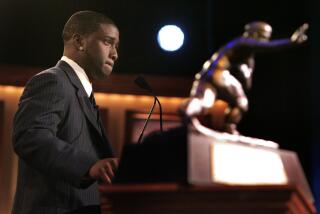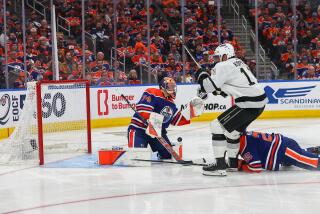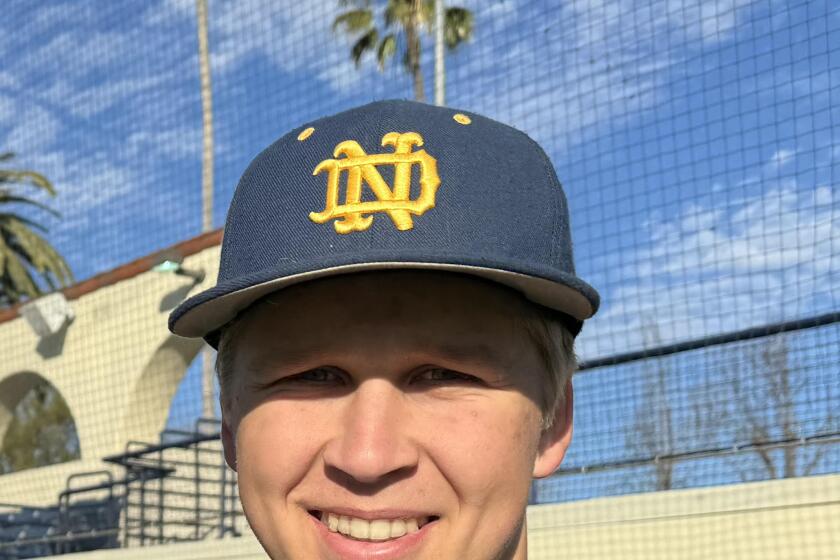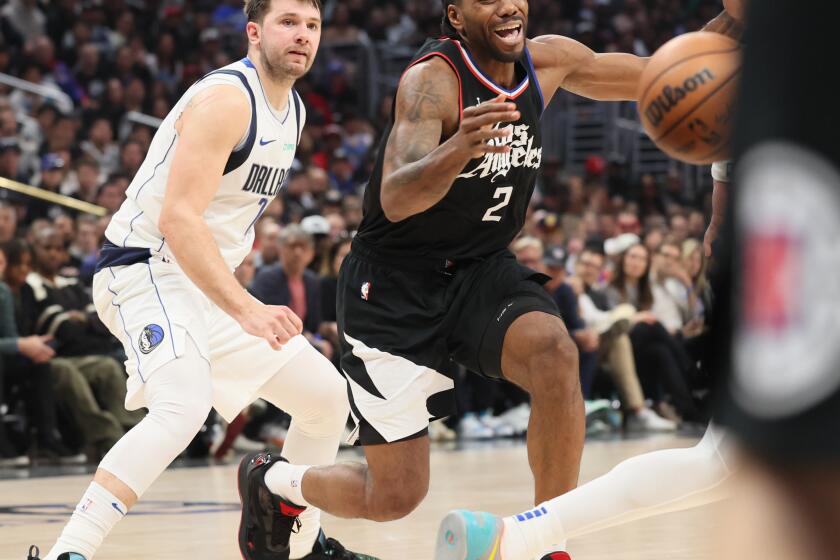Should God go to the ballgame?
On Sunday, Christian baseball fans will stream into Dodger Stadium for what is becoming more common fare at professional ballparks across the country -- “faith day.”
Following the Dodgers vs. Rockies game, fans with special tickets will gather in a corner of the parking lot for a concert by the Christian rock band Hawk Nelson, an appearance by characters from the “Veggie Tales” Christian television program and testimonials by several devout Dodgers. The purpose, according to event organizer Brent High, is to promote the Gospel of Jesus.
High and his Christian events-promotion company, Third Coast Sports, have been organizing faith days and faith nights around minor league baseball for years. They reached the major leagues last season with three events at Turner Field, home of the Atlanta Braves, and will be in 10 major league cities this season. The event at Dodger Stadium will be the first in L.A.
These events, which blend religion and commerce, are the product of a partnership between High’s company and host teams. Third Coast undertakes energetic outreach to evangelical churches, getting baseball-loving church members (and, more important, their unconverted invitees) to turn out for the game and a special religious program. Believers nourish their faith and perhaps extend it to others, and teams welcome the typical surge in ticket sales and action at the merchandise and food stands. The result, according to High, “is happy teams, happy churches.”
But not everyone is so happy.
Critics of the Christianizing of pro sports -- including interfaith groups, Jewish leaders and secular progressives -- have voiced reservations about the seemingly ever-closer relationship between evangelical sports ministries and major professional sports teams. Frequent on-field religious gestures by players already rankle many -- does it really honor God to knock the snot of your opponent on the football field and then point to the sky? And shout-outs to God during live post-game interviews offend those fans who would prefer to enjoy their sports without a dose of in-your-face religion.
Remember the owner and the coach of the Indianapolis Colts who both praised God before a worldwide television audience while collecting the Super Bowl trophy last winter? It’s no accident that scenes like that have become a common feature of the pro sports landscape. The Fellowship of Christian Athletes and similar sports ministries have been operating behind the scenes for decades to minister to sports figures and encourage them to use their high-profile platform to spread the Christian message.
Ballpark faith events -- one of the newest wrinkles in evangelism through sports, and the one that invites the broadest participation -- raise legitimate concerns. Sports franchises are quasi-public resources (through taxes and other civic backing) that belong to the religiously diverse communities that support them. Is it appropriate for teams to help further the agenda of one religious group with an often-divisive message and considerable political baggage?
And those politics lie just below the surface of evangelical activity in sports. Until last year, Third Coast frequently put on faith events in partnership with James Dobson’s Focus on the Family, a leading Christian-right organization associated with the Republican Party and a staunchly anti-gay message. The former partnership between Third Coast and Focus on the Family is emblematic of a larger pattern of strong ties between Christian activity in pro sports and conservative political interests.
To his credit, High shies away from what he calls “ambush evangelism,” a style of Christian outreach that can insult followers of other faiths or those of no faith. Third Coast’s events in major league baseball typically restrict the evangelism to before or after the game and to a discreet area of the stadium.
And while he acknowledges that faith night would be more appropriately dubbed “evangelical Christianity night,” High says he’s open to the events becoming more ecumenical. Evangelicals dominate religious activity in sports because they’re the ones with the inclination, energy and entrepreneurial chutzpah to insert themselves into the game.
A complete separation of church and sports is neither practical nor necessary. But must religious activity in major league sports skew so strongly in a conservative direction? If they are here to stay, here’s hoping faith days at Dodger Stadium and other ballparks eventually live up to their name and embrace more than one form of religion.
More to Read
Get our high school sports newsletter
Prep Rally is devoted to the SoCal high school sports experience, bringing you scores, stories and a behind-the-scenes look at what makes prep sports so popular.
You may occasionally receive promotional content from the Los Angeles Times.






